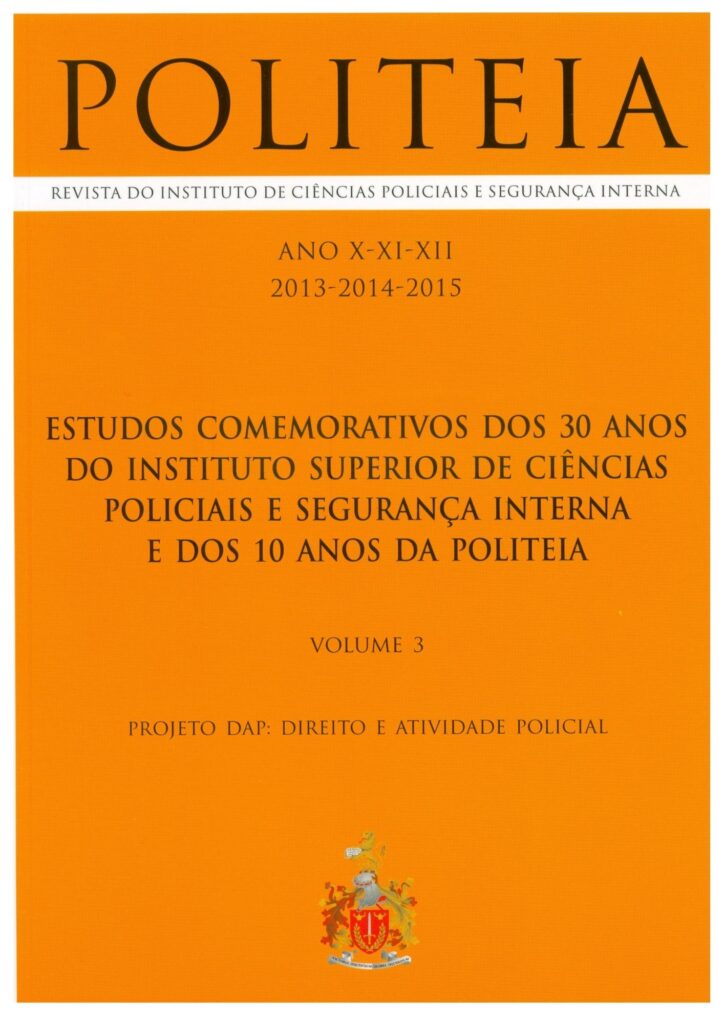A Admissibilidade da Margem de Livre Decisão Policial na Proteção versus Restrição de Direitos Liberdades Fundamentais
Key Words
A Deo Rex, a rege lex – O Rei vem de Deus, a Lei vem do Rei. Outrora, tudo se resumia a esta expressão. Aos cidadãos não lhe eram providos quaisquer direitos, liberdades e garantias e o poder concentrava-se todo no Rei, inexistindo assim o princípio da separação de poderes. Com o Estado liberal, surgem os primeiros resquícios do princípio da legalidade com o intuito de delimitar o poder do monarca. Hoje, subordinados ao princípio da juridicidade surge a questão de saber se é (in)admissível a margem de livre decisão policial na proteção versus restrição de Direitos e Liberdades Fundamentais. Porém, antes de respondermos devemos refletir sobre outra questão: Será que a obediência cega e absoluta à lei e ao Direito, quer pela Administração, quer pelo cidadão se coaduna com a conceção do Homem fraco propenso a errar? Não. Por um lado, ao legislador, é-lhe impossível regular todas as atividades, desde logo pela sua imprevisibilidade. Por outro lado, cabe, também, ao legislador emanar normas gerais e abstratas e não de forma pormenorizada e concreta dotadas de imperatividade e coercibilidade. Face a estas situações, até onde a Autoridade Policial, in casu, pode gozar de uma certa margem de livre decisão? Estaremos apenas perante uma discricionariedade optativa ou uma discricioriedade de decisão? A discricionariedade não se resumirá a zero na maioria dos casos? Ou a Autoridade Policial apenas goza de uma discricionariedade técnica e/ ou táctica?
A Deo Rex, a rege lex – Regal powers come from God, while legal powers derive from the king. Once, it all came down to this expression. Citizens were not provided of any rights, freedoms and guarantees and the power was all concentrated in the King, so the principle of separation of powers was lacking. With the liberal state, the first remnants of the principle of legality emerge in order to restrict the power of the monarch. Nowadays, subordinate to the principle of legality come up the question of whether it is (un)admissible the margin of police free decision in protection versus the restriction of Rights and Fundamental Freedoms. However, before answering that question we must consider another one: Will the absolute and blind obedience to the legislations and law, either by Governance or by the common citizen is consistent with the allowance of the weak man willing to make mistakes? No. On the one hand, to legislator, it is impossible regulate all activities, immediately by its unpredictability. On the other hand, it is also the role of legislator to issue general and abstract norms and not in detail and concretely way provided with imperativeness and coercivity. Given these situations, until where the Police Authority, in casu, may enjoy a degree of free choice? Are we just facing an optative discretion or decision discretion? The discretion does not summarize down to zero in most cases? Or the Police Authority only enjoys a technical and/or tactical discretion?
Versão original
Versão original
Outros artigos nesta edição
-
Editorial
Manuel Monteiro Guedes Valente
-
Reunião Científica Internacional: Direitos Fundamentais e Atividade Policial
Manuel Monteiro Guedes Valente
-
Força Constitucional na Democratização da Atividade Policial: o projeto audiência de custódia no Brasil
Gilson Matilde Diana
-
A Admissibilidade da Margem de Livre Decisão Policial na Proteção versus Restrição de Direitos Liberdades Fundamentais
Fábio Camelo
-
A segurança privada: limites à sua actuação num Estado de Direito Democrático
João Simões
-
La Actuación Policial y el Respeto de los Derechos Fundamentales en España como Manifestación del Dificil Equilibrio entre Libertad y Seguridad
Adán Carrizo González-Castell
-
Medidas Cautelares e de Polícia e os Direitos Fundamentais
Joel Fernandes Araújo
-
A Inspeção-Geral da Administração Interna no Controlo da Atividade Administrativa Policial
Margarida Blasco




